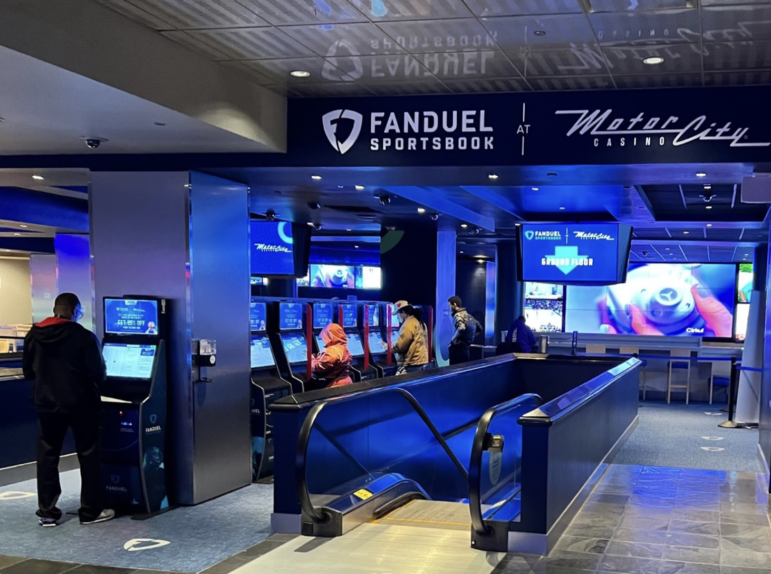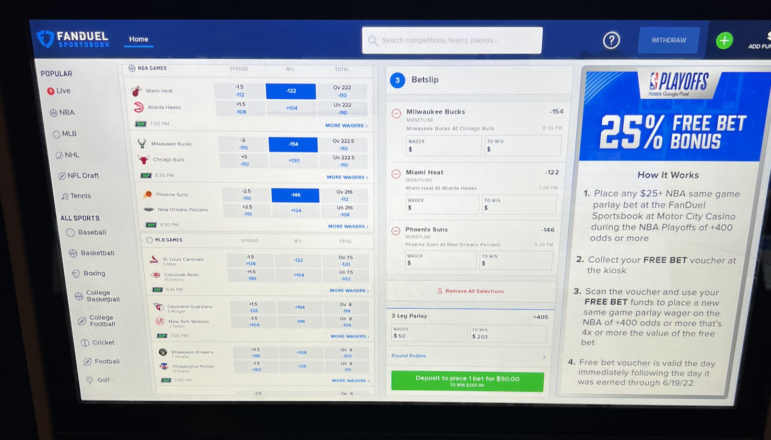
Since Michigan legalized online casinos and sports betting in December 2019, problem gambling has spiked.
Most early research done on problem gambling linked addiction to proximity; the closer a person was to a casino, the more likely to become a problem gambler. When new casinos opened, issues with problem gambling doubled within a 50 mile radius. Now, casinos are as close as an internet connection.
The legalization of online play occurred just months before the initial COVID lockdowns. With other forms of entertainment closed, some turned to digital entertainment, which now included gambling.
“We have seen a rise in problematic play,” said Caitlyn Huble, communications director for the National Council on Problem Gambling. “People are gambling more and with more money.”
Michael Mooney, a gambling addiction counselor, said that the usual time between a person’s first twinge of interest in gambling and the point where they realize they have a problem is several years in a brick-and-mortar casino. Internet gambling has shortened that to just a few months.
“In the first six months of Michigan legalizing online gambling, no one was calling into the helpline to report a problem,” said Mooney, attributing it to the honeymoon phase new gamblers feel. “Now it’s like the dam has broken. I am dealing with a number of people who are in full-blown crisis.”
“We used to say what happens in Vegas, stays in Vegas, but now what happens in Vegas is happening in Michigan,” said Mooney.
Problems follow gambling addictions
Gambling is referred to as the hidden addiction, and legalizing it has exacerbated that.
Gambling addictions can have an endless list of consequences in participants’ lives, starting with mental health problems. “One in five problem gamblers attempt suicide,” said James Loree, an East Lansing counselor certified in problem gambling treatment. Other consequences include bankruptcy, even driving some to crime, embezzlement and jail time. Two out of three gamblers will commit an illegal act to take care of a problem caused by their gambling.
“Addiction in general, but especially gambling addiction, is never isolated to one individual,” said Loree. It affects family, friends and every relationship, and is a large factor in divorce.
Sports betting grows in popularity
“The legalization of online sports betting has opened the floodgates for problem gambling,” said Loree. He saw an influx of gambling addiction patients almost immediately after the legalization, as online casinos and sports betting ads flooded television and mobile sites.

“It’s all about perception,” said Loree. Many online sportsbooks “spot” players several hundred dollars to play with at first and use third-party money transferring like Venmo, giving the illusion of finance-free gambling. The first phase of compulsive gambling is winning, but in the long run, the casino must win.
Sports betting increased the issues seen in other forms of gambling. The national council’s 2021 study found that many of the negative effects that problem gamblers experience were far more prevalent in sports betters.
A new demographic emerges
The National Council on Problem Gambling’s 2021 study shows that the new demographic most likely to develop a gambling addiction are white males, aged 18 to 35, with a college degree. College-age demographics are heavily targeted and drawn into online betting. As the most digitized generation, anything available at the tap of a finger is appealing, and interest in sports betting is prevalent as sports games of all kinds play in constant rotation year-round in college bars.
“In the past couple of weeks, I’ve had two new clients with the presenting issue of problem gambling,” said Loree. Both clients are young adults in their early to mid 20s, either in college or recently graduated. “They are several thousands of dollars in debt, having relationship conflicts with their families, and depression, all stemming from problem gambling.”
“I’m not exaggerating when I say I participate literally every day,” said 25-year-old Jalen Bailey. “I’m addicted.” Bailey said that the possibility of making a livable profit is one of the main motivators to gamble he sees among peers.
Bailey mentioned the anger, anxiety and frustration that comes with losing. “I always want to hurry and make the money back that I lost,” he said. “It’s so easy to become engulfed in the need to make the money back.”
Treatment and recovery needs updating
“For every person who seeks treatment, 10 more need it and don’t seek it,” said Loree. Despite the omnipresence of the issue, those who seek help are few and far between.
There are two approaches to gambling disorder recovery. Some gamblers do not want to quit entirely, but rather just stop the type of gambling they compulsively engage in. For example, if an individual is compulsively playing slot machines, they may wish to stop playing slots, but continue buying lottery tickets.
Gamblers Anonymous, a partner to the Michigan Association for Problem Gambling , maintains that if an individual wishes to recover from a gambling addiction, they must commit to fully recovering, and not engage in any form of betting.
Michael Burke, president of the Michigan association and counselor for gaming addictions, says that to quit one addiction, addicts have to quit them all. “I tell gamblers not to drink, and drinkers not to gamble,” he said. Gambling addictions have strong links to other substance abuse issues, either by the individual or somewhere in their family.
“We have to break the control that gambling has on them,” said Burke. “One way to do that is a long-term 30-day in-patient rehab program.” Research has shown the efficacy of complete in-patient rehabilitation, and the association has pushed for Michigan to join the handful of other states with such programs.
In Michigan, problem gambling treatment consists of therapy, one hour a week for 10 weeks, which leaves problem gamblers with the other six days and 23 hours to slip back into addiction. Online gambling makes that relapse easier.
Currently, the association uses dues and donations to send some addicts to a Louisiana gambling rehabilitation center’s 30-day in-patient program.
Michigan has a split interest in gambling
The state of Michigan enables the gaming industry. By law, every commercial and tribal casino may partner with one online casino and one online sportsbook. All report to the Gaming Control Board and pay state taxes. The Michigan Bureau of Lottery is responsible for the online and physical sale of lottery tickets.
Michigan’s Compulsive Gaming Prevention Fund is funded by gaming revenue and pays for gambling resources and treatment through the Michigan Department of Health and Human Services.
“Since 1972, the Michigan Lottery contributes $1 million to problem gaming services each year,” said Jacob Harris, public relations manager of the Michigan Lottery. It is set in statute that the lottery contributes this exact amount to the MDHHS, regardless of yearly revenue from gambling.
In 2021, online gaming and sports gambling in Michigan made $1.1 billion in earnings, according to the Michigan Gaming Control Board. After taxes, $209 million went to the state. Only $1 million went to the Compulsive Gaming Prevention Fund.
In January to March 2022, Michigan’s online sportsbooks and casinos made more than $465 million in revenue combined. Although the state allocates a budget of $5 million in total per year for problem gambling prevention, it takes in exponentially more in gaming tax revenue. This develops a split interest of limiting problem gambling and profiting from it, which adds to the complexity of the issue.
“It’s a way for the state to increase revenue without increasing taxes on the masses,” said Michael Mooney, the MAPG representative to the NCPG. “The more the population loses, the more kickback the government gets, so they have little or no incentive to put up guard rails to slow down the problem side of gambling.”
Looking towards the future for gambling
“We recognize that gambling is something that the majority of people can do as an educational, fun activity,” said the National Council on Problem Gambling’s Huble. “The goal is to keep it in that safe space without it becoming a risky activity.” She said raising awareness is the best way to do so.
Huble said that the first line of defense for problem gamblers is the national helpline. According to the council’s 2021 study, helpline contacts increased by 20% in 2021. The helpline and other resources use an important two-question screen: “have you ever gambled more money than you planned on when you began the episode?” and “have you ever lied about your gambling?” Problem gamblers will answer yes to these and more screening questions.
The council recently received a grant from the NFL, and the two will be launching a national public service announcement campaign later this year. This program is building on the existing NFL collaboration, called responsibleplay.org. In addition, the council recently launched its first round of agility grants, designed to fund prevention programs.
The Michigan lottery was the first in the United States to be awarded the National Committee on Problem Gambling’s Internet Responsible Gambling Compliance Assessment Program certification in 2015, renewing it every year since. This certification involves a rigorous audit, which the lottery prides itself on passing.
On the preemptive side, Burke said online gambling facilitators should limit their advertising. Television, radio, social media and print ads for gambling are everywhere, and there is no cap on advertising budgets.
“They need to regulate themselves, before the state legislation steps in and does it for them,” said Burke. “The state will be harder on them than they’d be on themselves.” Both national and state organizations are suggesting online casinos limit their advertising, to tame this new wave of gambling addictions. Michigan’s problem gambling helpline operates 24/7 1-800-270-7117, as does the national helpline at 1-800-522-4700